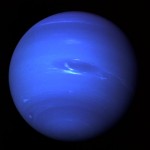
In 1821, French astronomer Alexis Bouvard reasoned that the eccentricities in the orbit of Uranus might be caused by the gravitational pull of a nearby planet. 45 years later, that planet, Neptune, was directly observed for the first time. Because it takes 146 years for Neptune to complete one orbit of the Sun, its orbit has until now not been fully observed:
Although Neptune is oblivious of this special time in its orbit, next year will be a special year for astronomy. It will be the first time for nearly 150 years that a planet has completed its first full orbit after its discovery.
Uranus, a planet discovered by Herschel in 1781 — approximately 10 AU closer to the sun than Neptune — completed its first orbit after discovery in the year 1865 (it completes one orbit of the sun every 84 years). And Pluto, the newly designated dwarf planet discovered by U.S. astronomer Clyde Tombaugh in 1930 — approximately 10 AU further away from the sun than Neptune — won’t complete its first orbit for another 168 years. We’ll have to wait until 2178 to see Pluto complete its first 248 year orbit around the sun.
 In 1821, French astronomer Alexis Bouvard reasoned that the eccentricities in the orbit of Uranus might be caused by the gravitational pull of a nearby planet. 45 years later, that planet, Neptune, was directly observed for the first time. Because it takes 146 years for Neptune to complete one orbit of the Sun, its orbit has until now not been fully observed:
In 1821, French astronomer Alexis Bouvard reasoned that the eccentricities in the orbit of Uranus might be caused by the gravitational pull of a nearby planet. 45 years later, that planet, Neptune, was directly observed for the first time. Because it takes 146 years for Neptune to complete one orbit of the Sun, its orbit has until now not been fully observed:
No comments:
Post a Comment